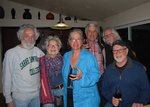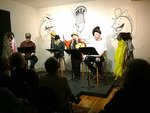 Narrowsburg
NarrowsburgLight Rain Fog/Mist, 43°
Wind: 8.1 mph
 Narrowsburg
NarrowsburgI’m a product of the “baby-boomer” generation. Defined as “those born between 1946 and 1964,” the “boom” generation consists of some 72 million of us …
Stay informed about your community and support local independent journalism.
Subscribe to The River Reporter today. click here
This item is available in full to subscribers.
Please log in to continue |




I’m a product of the “baby-boomer” generation. Defined as “those born between 1946 and 1964,” the “boom” generation consists of some 72 million of us (www.cnn.com) sprawled across the nation. Although my home town of Binghamton, NY (population 64,000) was considered a bustling metropolis while I was growing up, it had all the advantages of a small town, with a thriving business district, supported by employees of IBM, a variety of shoe manufacturers and Harper College (now Binghamton University). All that gave way to urban renewal and the beginning of the end of Binghamton’s golden age just as I was graduating high school and casting my eyes on the horizon. Big city life seemed highly desirable at the time, and I left, grateful to Binghamton for being large enough to expose me to what the world had to offer, but small enough to make me feel like I belonged.
After college, I went out into the world, first to New York City (population eight million) and later (gasp!) Los Angeles, CA (population four million)—both of which had plenty to offer, including crowded streets, horrible traffic, light and air pollution and an overall sense that I didn’t really feel at home. By the time I decided to switch gears, devote myself to a full-time writing career and rediscover small-town life, the population of my home town had shrunk to 47,000—which, after 14 years in Santa Monica, CA (population 92,000), still seemed far too large.
Meanwhile, I had been vacationing in the Catskills over the years and keeping my eye on things in this neck of the woods. On reading that the Town of Bethel, NY had just over 4,000 full time residents, I set my sights on small-town life and writing about the experience for a local paper.
What is small-town life? Well, last week, my dog was invited (uh huh) to attend a Town of Bethel meeting reporting on the progress of the new dog park being created in Smallwood (population 580), led by town supervisor Dan Sturm along with about a dozen residents sharing a common goal: to create a beautiful park where folks can socialize with their pets while communing with nature. Reminding myself that I was scheduled to return the next day to the same meeting room for an update on plans for the Kauneonga Block Party, (like ‘em on Facebook and save the date, June 17) I promised Supervisor Sturm that I would bring Dharma to the next park planning meeting, grabbed her leash, and headed home to freshen up before attending a “soiree” celebrating the Bethel Council of the Arts (bca@bethelart.org) and its many plans for the near future.
Meanwhile, in Narrowsburg, NY (population 431), ACT Underground director Kyoshin Lohr was in residence at the Krauss Recital Hall (www.artsalliancesite.org), readying her cast for two performances of “Greater Tuna.” It’s the first in a series of four comedic plays written by the team of Ed Howard, Jaston Williams and Joe Sears. This production featured Hudson Williams-Eynon, Laurie Guzda, Heidi Mollenhauer and Peter Walsh. The play, set in the fictional town of Tuna, Texas (“the third smallest town in the state”) is at once both amusing and disturbing, for although the program states that the play takes place in “the present,” it was actually first produced off-Broadway in 1982. It is noteworthy (thanks to Lohr) that the current mindset of much of the country is “presently” reflected in the 1980s concerns of the denizens of a small town populated with even smaller minds.
Audiences familiar with Mollenhauer and Walsh were not disappointed, since both performers delivered often hilarious interpretations of the more than 20 gossipy characters portrayed by the four actors on stage. Walsh, as town matriarch Bertha Bumiller, displayed a range of emotion that was deeply moving on occasion as well. Although the program stated that Hudson Williams-Eynon has “no prior theatre experience,” his performance defines (IMHO) what community theatre is all about. Under the deft guidance of skilled director Lohr, Hudson was better than good, highlighted by his interpretation of the local Humane Society’s earnest Petey Fisk. Newcomer (to me, anyhow) Laurie Guzda also delivered in spades, portraying both men and women with lightning speed and dexterity. In fact, the entire cast was finely tuned, well-matched and just plain entertaining.
While census numbers ebb and flow, and we encourage economic development in the Upper Delaware River region, I know that I am not alone in the desire to always be able to refer to our home (idle gossip aside) as a tribute to small town life. Chances are, that when I see you at the post office, you’ll know my dog’s name. I like that.
Comments
No comments on this item Please log in to comment by clicking here